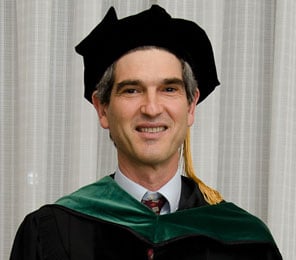 |
|
| Jeremy Luban, MD | |
The National Institute on Drug Abuse (NIDA), part of the National Institutes of Health, today named Jeremy Luban, MD, professor of molecular medicine and the David L. Freelander Memorial Professor in HIV/AIDS Research, one of three recipients of the 2012 Avant-Garde Award for HIV/AIDS Research. Dr. Luban will receive $500,000 per year for five years to support his research.
David Smith, MD, University of California San Diego, and Samuel Friedman, PhD, National Development and Research Institutes, New York, were also named Avant-Garde award recipients.
NIDA's annual Avant-Garde award competition, now in its fifth year, is intended to stimulate high-impact research that may lead to groundbreaking opportunities for the prevention and treatment of HIV/AIDS in drug abusers.
“This Avant-Garde award is another spectacular testament to Jeremy Luban's internationally recognized high impact as a thought leader in the HIV field,” said Michael P. Czech, PhD, the Isadore and Fannie Foxman Chair in Medical Research, chair and professor of molecular medicine and professor of biochemistry & molecular pharmacology. “His outstanding research has great promise to transform our thinking about HIV infectivity mechanisms and innovative strategies for new therapies.”
Luban plans to develop new methods for studying the ways in which human genes can influence whether an exposed person will become infected with HIV or, if infected, how the disease will progress. These studies will guide future strategies aimed at preventing and treating HIV in drug abusers.
“Despite 30 years of AIDS research, there is still no experimental system for studying how genes actually function in humans to regulate HIV replication, pathogenesis and immunity,” Luban said. “Now that the number of human genes suspected of influencing HIV is skyrocketing, the need for such technology has never been greater.”
Luban joined UMMS last year from the University of Geneva in Switzerland, where he was professor of microbiology and molecular medicine. He has been working on HIV/AIDS and related cellular issues in infectious disease for nearly 30 years. One of his most significant contributions to the field is the discovery of cellular factors that are important for HIV-1 replication or which confer immunity to this deadly virus. A native of Philadelphia, he earned his bachelor’s degree in biology at the State University of New York at Purchase, and his medical degree from Columbia University, where he later served as a faculty member.
“This year’s award recipients proposed especially exciting research aimed at reducing HIV transmission and progression,” said NIDA Director Nora D. Volkow, MD. “We expect that this innovative research will provide new leads in the fight against HIV/AIDS in drug abusing populations.”